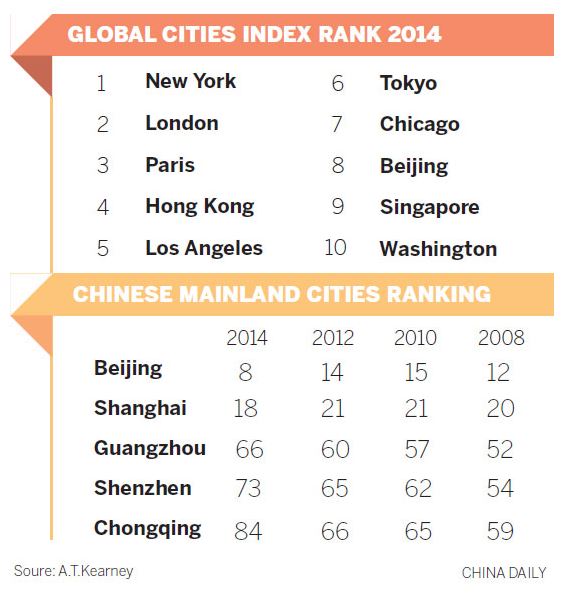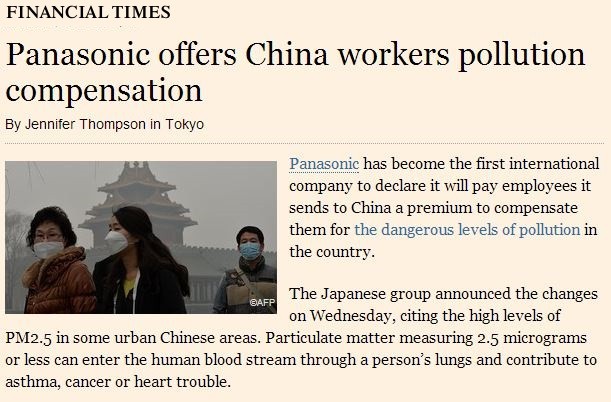
Beijing has made it into the top 10 of the world’s most global cities for the first time, ranking eighth in the A.T. Kearney Global Cities Index.
The index, introduced in 2008 by the global consulting firm, includes 84 cities.
Beijing scored an overall 3.5 in five categories, including business activity, human capital, information exchange, cultural experience and political engagement. It stood out from other Chinese cities in terms of the number of Fortune 500 companies, international schools, broadband subscribers and museums.
New York, London and Paris have held fast to their positions as first through third since 2012.
“The increasing global importance of Chinese companies has helped catapult Beijing to fourth place on the business activity dimension. This, together with some improvement in scores for human capital and cultural exchange, has been more than enough to offset declining relative performance in information exchange and international political engagement,” A.T. Kearney experts explained.
Johnson Chng, managing director of A.T. Kearney Greater China, said, “Clearly Beijing went up in the ranking due to its rising importance as a business center in addition to being the political center of China.”
However, he added, the air pollution issue is now a growing concern for many Beijing residents that, if not addressed soon, will cause an outflow of talent.
“In fact, many of my friends and business associates have moved out of Beijing in the last six months, and many are indeed contemplating the idea, too, for the sake of their family,” he said.
In a recent survey conducted by MRIC Group, an international executive recruitment firm, 47.3 percent of the 269 respondents in Beijing said they would like to relocate this year because of air quality concerns. The most-preferred destinations are North America, Shanghai, Europe, Hong Kong, Singapore and New Zealand.
As human capital is weighing ever more among the five categories, some companies have to improve the working environment to retain talent regarding the air quality in Beijing.
“Companies should prepare air purifiers especially when the buildings don’t have such machines,” said Robert Parkinson, founder and managing director of the international recruitment group RMG Selection.
Shanghai, ranking 18th in the index, was the only city on the Chinese mainland that came close to Beijing. In fact, it scored higher than Beijing in human capital, given its larger foreign-born population. Shanghai also performed well in business activity.
Beijing lags behind Shanghai in human capital because of the capital city’s “size of the foreign-born population, scores of universities in the global 500, number of inhabitants with tertiary degrees, international student population and number of international schools,” explained Chng from A.T. Kearney.
On the other hand, Shanghai ranked lower due to a less-ideal score in political engagement. Specifically, Shanghai is home to a smaller number of international organizations, embassies and consulates, think tanks, political conferences and local institutions with international reach.
The Shanghai Pilot Free Trade Zone will certainly help the city’s globalization in the long term. However, the impact and the speed of that depends on policy implementation as there are still lots of details to be sorted out in terms of how exactly Shanghai FTZ will work, Chng said.
“In the short term, I do not see any material change as most companies are simply trying to take advantage of the FTZ to help with the existing business rather than attracting significant new business,” said Chng.
Other Chinese cities in the list saw their rankings drop.
Guangzhou dropped from its rank of 60 to 66 this year due to a significant decrease in political engagement. Shenzhen dropped from 65 to 73 due to a decline in its human capital score.
Read the original article on China Daily: http://www.chinadaily.com.cn/business/2014-04/15/content_17434408.htm




